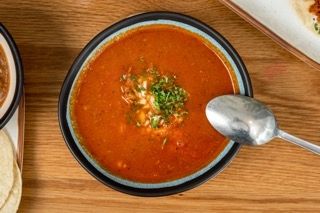Is Mexican Food Healthy And Balanced? Unpacking the Nutritional Perks of Traditional Ingredients
The concern of whether Mexican food is healthy and balanced invites an exploration of its standard active ingredients. Beans and corn work as foundational staples, rich in healthy protein and fiber. Avocados give advantageous fats, while different natural herbs and seasonings add flavor and health and wellness benefits - happy hour. With each other, these parts develop a tapestry of nutrition. However, the healthiness of Mexican cuisine typically depends upon prep work techniques and section dimensions. What duty do these variables play in establishing its total dietary worth?
The Power of Beans: Healthy Protein and Fiber-Rich Staples
Frequently neglected, beans serve as a cornerstone of Mexican food, supplying a riches of nutritional benefits. Rich in healthy protein, they are an outstanding plant-based choice for those looking for to meet their dietary healthy protein requires. This high protein material supports muscular tissue fixing and development, making beans vital for both vegetarians and meat-eaters alike. Additionally, beans are a remarkable source of nutritional fiber, which helps in digestion and advertises a feeling of fullness, possibly assisting with weight management.
The selection of beans utilized in Mexican dishes, such as black beans, pinto beans, and kidney beans, adds to a diverse taste account and can enhance dishes nutritionally. Beans are reduced in fat and include essential vitamins and minerals, consisting of iron, folate, and magnesium. With each other, these qualities make beans a vital active ingredient, delivering both sustenance and nourishment in typical Mexican fare.

Corn: a Versatile Grain With Nutritional Perks
Corn attracts attention as a versatile grain fundamental to Mexican cuisine, celebrated not only for its cooking applications however additionally for its remarkable dietary account. As a primary ingredient in dishes like tortillas, tamales, and pozole, corn offers vital nutrients that add to a well balanced diet plan. Rich in carbs, it works as a considerable power source, while likewise being low in fat, making it a beneficial choice for different dietary needs.
Corn is a great source of dietary fiber, which assists in food digestion and advertises satiety. It includes significant amounts of vitamins such as B-complex vitamins, which are essential for basal metabolism. The existence of antioxidants, particularly carotenoids, contributes to total health and wellness by minimizing oxidative tension. Additionally, corn is gluten-free, catering to those with gluten level of sensitivities. Generally, the nutritional advantages of corn emphasize its significance in conventional Mexican food and its duty in a healthy and balanced diet plan.
Avocados: Healthy Fats and Nutrients in Every Bite
Avocados play a substantial function in Mexican cuisine, enhancing meals with their creamy appearance and rich flavor. Past their culinary allure, avocados are celebrated for their impressive dietary profile. They are an abundant source of healthy monounsaturated fats, which can help reduced poor cholesterol levels and assistance heart health. In addition, avocados are packed with essential nutrients, including potassium, vitamin E, and B vitamins, adding to overall health.
The high fiber content in avocados help digestion and advertises satiation, making them a helpful addition to any type of dish. Their distinct nutrient make-up can likewise sustain skin health and supply anti-inflammatory benefits. Integrating avocados right into conventional Mexican recipes or enjoying them as a standalone snack can boost both flavor and nutrition, showing why they are a beloved staple in Mexican cuisine. Generally, avocados offer a tasty means to enjoy healthy fats and critical nutrients in every bite.

Herbs and flavors: Flavorful Health And Wellness Boosters
While taking pleasure in the abundant tastes of Mexican food, one can not ignore the crucial duty that spices and natural herbs play in boosting both preference and wellness. Active ingredients such as cilantro, chili, and oregano peppers not only add to the vivid taste account however likewise offer significant health advantages. For circumstances, cilantro is recognized for its purifying buildings, aiding to get rid of heavy metals from the body, while oregano is loaded with anti-oxidants and possesses anti-inflammatory effects.
Chili peppers, a staple in many Mexican recipes, consist of capsaicin, which has been connected to enhanced metabolism and discomfort relief. Additionally, seasonings like cumin and coriander support digestion and might aid in blood sugar level guideline. Incorporating these savory health and wellness boosters into dishes take out and delivery not only boosts the culinary experience yet likewise advertises general health, making Mexican cuisine not simply tasty, yet likewise nutritionally advantageous.
Standard Cooking Techniques: Enhancing Nutrition and Taste
Traditional food preparation approaches in Mexican cuisine play an essential function in boosting both nutrition and taste, as they frequently focus on fresh ingredients and classic strategies. Methods such as nixtamalization, where corn is soaked and prepared in an alkaline solution, not just boost the nutrient profile of tortillas however additionally enhance their digestibility - happy hour. In addition, making use of sluggish food preparation methods, like stewing or braising, enables tastes to fuse wonderfully while maintaining the honesty of the ingredients

Regularly Asked Questions
Are Mexican Food Portions Typically Larger Than Other Foods?
Mexican food parts are often bigger than those of many other foods. This characteristic shows traditional dining techniques, emphasizing common sharing and hearty dishes, which can result in an extra substantial serving dimension overall.
Exactly how Does the Prep Work Method Affect Healthfulness of Mexican Food?
Prep work methods considerably affect the healthiness of Mexican food. Methods such as cooking or steaming maintain nutrients, while frying can enhance undesirable fat web content. Choices of components and cooking designs inevitably determine overall nutritional worth.
Can Mexican Food Be Customized for Specific Dietary Restrictions?
Mexican food can undoubtedly be customized for details dietary restrictions. Substitutions, such as utilizing corn tortillas for gluten-free diet plans or including even more veggies, make it possible for individuals to enjoy conventional flavors while fitting different nutritional requirements.
What Are Typical False Impressions About Mexican Food and Health?
Common misconceptions about Mexican food include the belief that it is naturally harmful, extremely zesty, and only concentrated on fats. In truth, typical recipes usually include healthy components and can be tailored to various dietary demands.
Exist Much Healthier Options at Mexican Dining Establishments?
Healthier choices at Mexican restaurants frequently include smoked meats, beans, and fresh veggies. Selecting dishes that emphasize entire components and preventing heavy sauces can bring about an extra healthy dining experience, advertising general wellness.
The variety of beans made use of in Mexican meals, such as black beans, pinto beans, and kidney beans, contributes to a varied flavor profile and can boost meals nutritionally. Avocados play a significant duty in Mexican cuisine, complementing recipes with their velvety texture and abundant flavor. Including avocados into traditional Mexican recipes or enjoying them as a standalone treat can improve both taste and nutrition, demonstrating why they are a cherished staple in Mexican cuisine. While appreciating the rich tastes of Mexican cuisine, one can not overlook the necessary role that spices and natural herbs play in enhancing both preference and health. Typical cooking approaches in Mexican cuisine play an essential role in improving both nutrition and flavor, as they often prioritize time-honored methods and fresh ingredients.